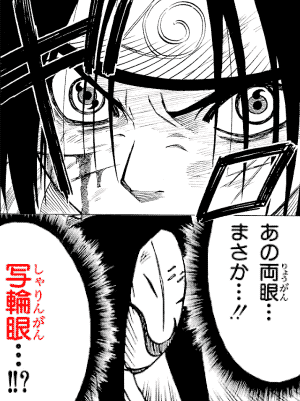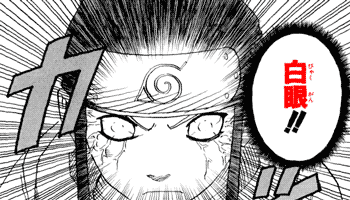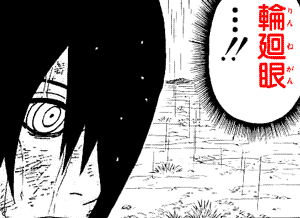Well, prepare to be disappointed. As all names in Japanese, they sound cool when they are in a language you don't understand and lame otherwise.
眼
First off, the gan 眼 all these words share? It means "eye". Literally "eye." So saying sharingan eyes is like saying sharin eye eyes. A tautology, as Doctor Who fans would gladly inform you.写輪眼
The sharin in the word sharingan is written with the kanji 写 and 輪. It's a made up word, as far as I can tell. There's nothing called a sharin 写輪 in everyday Japanese. It's a thing that only exists in Naruto, but, regardless, let's take a look at the kanji.So, for the kanji 写 its part of words like "photography," shashin 写真, and "projecting [on a screen]", utsutsu 写す, and even "drawing (sketching) from real life," shasei 写生. Anyway, the meaning of 写 is to copy something and put it into something else.
For the kanji 輪, it's part of words like "finger ring" yubiwa 指輪, and "necklace" or "collar," kubiwa 首輪, and even just wa 輪 which means "ring" or "wheel." Anyway, it's a kanji for circle-shaped, loopy things.
So, together we have...
Uh...
Copy-wheel eyes? Or something? I don't know. The sharingan copies jutsu and looks like a wheel. So... yeah. It's copy-wheel eye.
That's just lame. Disappointing, honestly.
Manga: Naruto ナルト (Chapter 27, 覚醒・・・!!)
- giro
ギロ
*glare* (mimetic word.) - ano ryougan...
あの両眼…
That pair of eyes... - masaka...!!
まさか…!!
[Could it be?!] - sharingan...!!?
写輪眼…!!?
Copy-wheel eyes...!!?
万華鏡写輪眼
But it's alright, we still got the mangekyou sharingan 万華鏡写輪眼, right? The better sharingan! The super-saiyan sharingan. Sure the mangekyou of mangekyou sharingan has some super cool meaning in Japanese, right?Well, no. Sorry to burst you bubble.
In Japanese, mangekyou 万華鏡 means "kaleidoscope". The weird cool-looking glass thingy. So mangekyou sharigan would mean "copy-wheel kaleidoscope eyes" which isn't any bit better at all.
Hey, but at least kaleidoscopes are cool and mangekyou is a real word this time!
Sometimes the spelling mangekyō sharingan is used instead of mangekyou sharingan. This is just a different romaji for the same Japanese word. There's no difference between the two.
白眼
Alright, this one is so easy you might even know it already.It's also even more lame than sharingan, so ready yourself.
First, what color are the byakugan 白眼?
- Are they "black", kuro 黒?
No? - Are they "red," aka 赤?
Nope? - Are they "white," shiro 白?
Yep? They are?
Well. Yeah. Believe it or not, byakugan 白眼 is, literally, very literally, in the literal meaning of literally, "white eyes."
Manga: Naruto ナルト (Chapter 41, 悪魔の囁き・・・!?)
- byakugan!!
白眼!!
White eyes!!
(note: the word for the number "one hundred," hyaku 百, can be read as byaku びゃく if it undergoes rendaku 連濁, and then it's homonym with the "white" byaku 白. But don't be mistaken: the name of the eye is "white eyes," written with the kanji for "white," not "one hundred eyes.")
Now, I'm not the best guy in the world at naming things myself, but I think, personally, my honest opinion, you shouldn't just call the super powerful ability of your characters "white eyes" just because... they are... "white eyes."
It's kinda racist. I mean, I can imagine an anime where the plot is about discriminating against white-eyed people, calling them the byakugan 白眼 and stuff. You know. Just like Kurapika in Hunter x Hunter has red eyes and his people are... hunted? Because of it? Anyway.
輪廻眼
Last, but no less eye than the others, the rinnegan 輪廻眼. Which is also sort of white, but thankfully not called "white eyes" this time. It also got plenty of rings on it but it's not called anything-wheel this time, either.However, unless you're quick to forget these things, the kanji 輪 which we saw in sharingan 写輪眼 and meant "wheel" is also part of rinnegan 輪廻眼 this time. But fear not! It definitely has nothing to do with wheels.
The rinnegann 輪廻眼, or rather, rinne 輪廻 is an actual Japanese word, thankfully, meaning "the endless cycle of death and rebirth." It's actually also the Buddhist term "samsara." Because it's a cycle it has the kanji 輪 that's used for wheel and loopy things. A cycle kind of loops, so...
Of all three this is the only cool word. At least it has a story behind of it, a philosophy, you know? Endless cycle of death and rebirth? The words sharingan and byakugan could learn something from the word rinnegan.
Manga: Naruto ナルト (Chapter 373, 師弟時代・・・!!)
- rinnegan...!!
輪廻眼…!!
Eyes of the endless cycle of death and rebirth...!! (this is long.)
Samsara eyes...!! (better.)



well, nice to know! thanks for working hard on this!
ReplyDeleteSharingan is in cannon pin wheel eye. Byakugan white eye. The rinnegan is correct
ReplyDeleteBut great work on the research and sorry to burst your bubble.
ReplyDeleteWhere did you see the term "pin wheel eye"? I've seen "copy-wheel eye" before which is closer to what sharingan means, but "pin wheel eye" is kinda off.
DeleteByakugan translated as one hundred eyes in Google translate .. Which related to his 360 degree view
Delete"hundred eyes" would only be true if it was written 百眼, with hyaku 百, the kanji for "hundred," but it's written 白眼, with shiro 白, the kanji for "white."
DeleteByakugan translated as one hundred eyes in Google translate .. Which related to his 360 degree view
Delete"hundred eyes" would only be true if it was written 百眼, with hyaku 百, the kanji for "hundred," but it's written 白眼, with shiro 白, the kanji for "white."
DeleteI have almost no knowledge of kanji as my Japanese is Hiragana level, though, as far i know Japanese quite like word games, so when you want, just trace the etynological bacground to chinese versios and alternate meaning, or try replacing them entirelly or partially with words that have the same pronunciation, i doubt it will be worthwhile but then again, you might be surprised, each kanji has much more depth than it is obvious when you take some different elements into consideration. I am much into ontology and i am most often awed by the depth of Japanese even more so than Hebrew.
ReplyDeletewhatis RASENGAN
ReplyDelete螺旋丸. Spiral, rasen 螺旋, and ball, gan 丸. Spiral ball, a ball that twists around like a screw. If you have watched Tengen Toppa you probably have heard this rasen a lot.
DeleteWell, as far as the Byakugan goes, it it actually a bit more clever of word play. As earlier stated, the word "byaku" in "byakugan" can be translated as "hyaku" (one hundred) if it undergoes rendaku. Although it is written with the kanji meaning "white." The play on it is basically, white eyes that *can* see at the level of a hundred eyes. So indirectly, it's like calling it the eyes of a hundred, not just "white eyes," which makes it a little bit better, y'know?
ReplyDeleteSame story with karate terms. First you think that it's something cool, something deep, historical, epic... Nope. It's just "front kick", "horizontal kick", "elbow strike", "fixation" and so on.
ReplyDeleteI guess Japanese people are practical people like every other people, and they don't want to use fancy words for simple things.
A brief google search links the word sharin to a torture device. So my way of seeing it is: Endless (wheel) torture eyes.
ReplyDeleteThank you for linking this kaleidoscope video! Amazing music in that video. Really moving and capturing. What a great piece of music.
ReplyDelete